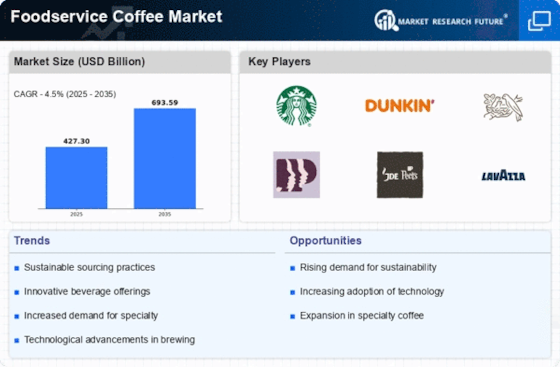Top Industry Leaders in the Foodservice Coffee Market

Strategies Adopted by Foodservice Coffee Key Players
The Competitive Landscape of the Foodservice Coffee Market is characterized by a mix of well-established industry leaders and emerging players, collectively contributing to the dynamic and competitive nature of the coffee service sector. As of 2023, key players in the market have strategically positioned themselves to cater to the diverse demands of consumers and capitalize on the global coffee culture.
Key Players:
Starbucks Corporation
The J.M Smucker Company
Costa Limited
The Coffee Bean & Tea Leaf
Peet's Coffee, Inc.
Soho Coffee Co.
The Kraft Heinz Company
Ediya Co. Ltd.
Juan Valdez
Tim Hortons
The Foodservice Coffee Market revolve around product innovation, global expansion, and strategic partnerships. Product innovation involves introducing new coffee blends, specialty beverages, and expanding the range of offerings to cater to evolving consumer preferences. Global expansion strategies include entering new markets, opening new coffee shops, and forming partnerships with local businesses. Strategic partnerships, such as collaborations with foodservice providers and retail chains, enhance the accessibility and visibility of coffee offerings.
Market Share Analysis:
The Foodservice Coffee Market is influenced by factors such as brand loyalty, pricing, customer experience, and store location. Companies with strong brand loyalty often command a higher market share, as customers are more likely to choose familiar and trusted brands. Competitive pricing strategies that balance affordability with perceived quality play a crucial role in gaining and retaining customers. The overall customer experience, including factors such as service speed, ambiance, and convenience, also contributes significantly to market share growth. Prime store locations, including high-traffic areas and strategic placements within retail outlets, can impact a company's ability to attract a broad customer base.
New & Emerging Companies:
The Foodservice Coffee Market contribute to the competitive landscape by exploring innovative business models, sustainable practices, and unique customer experiences. Independent coffee shops and specialty cafes often focus on artisanal coffee, personalized service, and creating a distinct ambiance. While these establishments may have smaller market shares compared to industry giants, their emphasis on quality and individuality makes them noteworthy contributors to the market's diversity.
Industry Trends:
Industry trends provide insights into ongoing developments within the Foodservice Coffee Market. A notable trend in 2023 is the increasing focus on sustainability and ethical sourcing. Key players are investing in programs and certifications that ensure environmentally friendly coffee cultivation and fair trade practices. Additionally, investments in digital technology, such as mobile ordering apps and loyalty programs, showcase the industry's commitment to enhancing the customer experience and adapting to changing consumer behaviors.
Competitive Scenario:
The Foodservice Coffee Market remains dynamic, with companies adopting diverse strategies to gain a competitive edge. There is a notable emphasis on digitalization and technology integration, with companies investing in mobile ordering, contactless payments, and data analytics to enhance operational efficiency and customer engagement. Additionally, companies are exploring opportunities for product differentiation, such as introducing limited-time offerings, seasonal beverages, and expanding the range of non-coffee alternatives.
Recent Development
The Foodservice Coffee Market is the growing adoption of sustainability initiatives beyond product sourcing. Key players are increasingly focusing on reducing environmental impact through eco-friendly packaging, energy-efficient store designs, and waste reduction programs. This development reflects the industry's acknowledgment of the importance of holistic sustainability practices and aligns with broader consumer expectations for corporate responsibility.

- Beta
Beta feature










